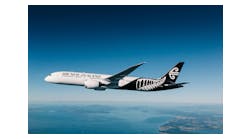Aug. 26--WATERLOO, Iowa -- After the U.S. Justice Department recently filed suit to stop what would be the largest airline merger in U.S. history -- American Airlines, which flies between Waterloo and Chicago twice a day, and US Airways -- aviation experts were mixed on how the move would affect local air traffic.
The Justice Department joined six states and the District of Columbia in a lawsuit Aug. 13 to block the proposed merger.
The government contends the merger -- which would create the world's largest airline, with more than 100,000 workers and 187 million passengers annually -- would be bad for competition.
The plaintiffs say the deal would put 70 percent of the U.S. market in the hands of four major airlines -- United Airlines, Delta Air Lines and Southwest Airlines are the others.
Stopping the merger ultimately could boost air traffic through Waterloo, said Greg Raiff, CEO of Seabrook, N.H.-based Private Jet Services Group.
"What's happening in other small markets, when airlines merge, there's a tendency to consolidate those routes through smaller cities like Waterloo," Raiff said. "They could decide they can route all those fliers through other cities, or they could decide to scale back service from two flights to one."
Merger proponents say the marriage of American and USAir would strengthen competition by combining two relatively weak airlines -- American is currently in Chapter 11 bankruptcy -- to create a stronger, healthier carrier that could viably take on competitors.
"I would say the merger going through is a benefit for folks in Waterloo because they would get the added USAir market," said Steve Wareham, interim director of Waterloo Regional Airport. "Most people flying out of Waterloo are going to be American Airlines passengers in American Airlines mileage programs. Most airports that have American or a USAir presence are generally pleased with the extension of routes, connections and frequent flier programs."
A merger that combines both airlines' networks would be good for Waterloo travelers, Wareham said.
"American has a very strong presence into South America, and USAir has excellent routes to Europe and the East Coast," Wareham said. "Really, from O'Hare, you can get anywhere in the world. I'd say in the long run the merger was going to benefit (travelers out of Waterloo)."
A blocked merger could create some unintended consequences, said Catherine Banks, a travel consultant with Legacy Travel in Chicago and Dallas.
"If the goal is to maximize competition, I don't think having two crippled airlines is helpful," she said.
Banks said it was difficult to predict how that scenario would affect Waterloo, which has two direct flights a day to O'Hare International Airport in Chicago.
"If the merger doesn't go through, they'd be careful with their money," she said. "I'd imagine if Waterloo is profitable for them, it will be fine. If not, I'd expect to see some cuts, for sure."
Raiff said, however, a combined airline serving Waterloo doesn't necessarily make it better for local travelers.
"In a town like Waterloo, you become captive to that one carrier who's gotten in even stronger position," he said. "What happens if the two-flight daily schedule becomes one flight? What happens if fares increase by $100? It cripples the small businesses in Waterloo who rely on air transportation. It's bad for the Waterloo industrial base and certainly bad for the economy general because it will be happening in other cities, too."
Banks said whatever happens, the suit won't be resolved soon.
"I don't think it's going to be a speedy resolution; they (American and USAir) definitely going to fight it," she said.
Copyright 2013 - Waterloo-Cedar Falls Courier, Iowa




